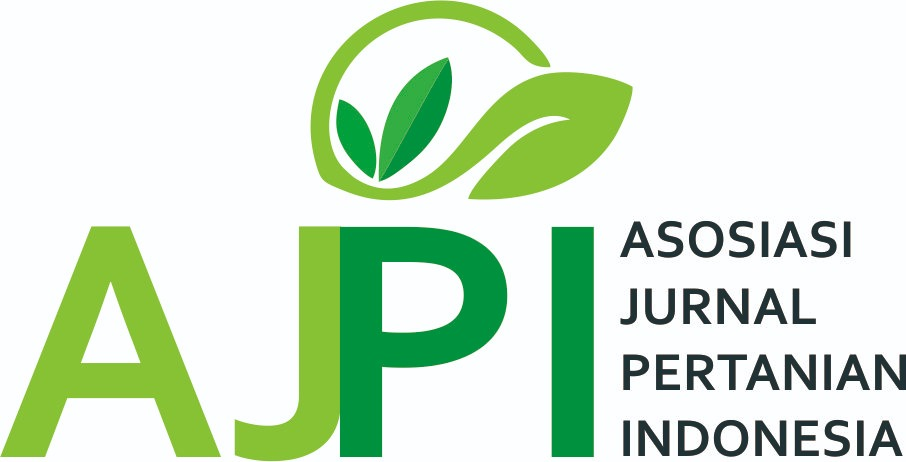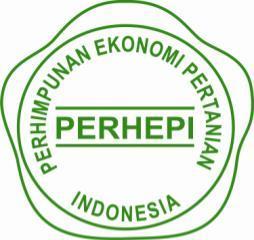The Effect Of Land Fragmentation On Agricultural Sector Regeneration In East Lombok
Abstract
Purpose : The purpose of this study is to determine the influence of land fragmentation on the regeneration of the agricultural sector in East Lombok. The location of the study was determined purposively in Keruak and Sakra Districts with a sample of 50 respondents determined by accidental sampling with the criteria of a sample age less than 40 years. Methodology : Analysis of the effect of land fragmentation on the regeneration of the agricultural sector using the Likert scale on all variables. Results : The results of the study show that more than 50 percent of the young generation stated that fragmentation is the cause of narrow land area, decreased production and productivity, low profits, and difficult production diversification. However, more than 90 percent of farmers are ready and will continue family farming activities. Findings: More than 50 percent of farmers stated that the bargaining position of agricultural products has always been low due to fragmentation. Novelty: This research provides new insights into the effect of land fragmentation on the regeneration of the agricultural sector. Originality: This study offers an analysis of the effect of land fragmentation on the regeneration of the agricultural sector using a Likert scale on all variables. Conclusion: Family, extension workers, and community support are needed to build a modern agricultural sector based on the younger generation. Type of paper : Empirical Research Article
Downloads
References
Abubakkor Siddik, M., & Ashiqur Rahman, M. (2022). Causes and Impacts of Rural Land Fragmentation in the Coastal Belt of Bangladesh. Indonesian Journal of Geography, 54(2), 206–212. https://doi.org/10.22146/ijg.67314
Arvianti, E. Y., Masyhuri, M., Waluyati, L. R., & Darwanto, D. H. (2019). Gambaran Krisis Petani Muda Indonesia. Agriekonomika, 8(2), 168–180. https://doi.org/10.21107/agriekonomika.v8i2.5429
Danquah, F. O., Twumasi, M. A., & Asiamah, B. K. (2024). Fields Apart: Exploring the Impact of Land Fragmentation on Technical Efficiency in Maize Farming Within Ghana’S Transitional Zone. The American Journal of Agriculture and Biomedical Engineering, 6(1), 1–6. https://doi.org/10.37547/tajabe/volume06issue01-01
Endang, P. R., Joni, I. M., Ikhwan, W., & Muhammad, A. (2022). Cultivation Potential Of Porang (Amorphophallus Muelleri Blume) In Central Indonesia. RJOAS, 12(December), 62–67. https://doi.org/10.18551/rjoas.2022-12.20
Gavgani, M. S., & Mohammadzamani, D. (2023). Analysis of the Effect of Land Fragmentation on Crop Productivity in Jiroft , Iran. Eurasian Journal of Agricultural Research, 21–28.
Iskandar, M. J., Anwar, M., & Ashari, R. (2024). Strengthening of Agricultural Labor Based on Local Wisdom Model Besiru in East Lombok District. Jurnal Ilmiah Membangun Desa Dan Pertanian, 9(1), 24–31. https://doi.org/10.37149/jimdp.v9i1.987
Iskandar, M. J., & Jamhari. (2020). Efficiency of rice farming in the corporate farming model in central java. Agraris, 6(2), 154–167. https://doi.org/10.18196/agr.6298
Iskandar, M. J., Prasetyowati, R. E., & Anwar, M. (2024). Risiko Produksi Usahatani Padi Model Corporate Farming Di Jawa Tengah. SEPA: Jurnal Sosial Ekonomi Pertanian Dan Agribisnis, 21(1), 43. https://doi.org/10.20961/sepa.v21i1.61481
Iskandar, M. J., Prasetyowati, R. E., & Ningsih, D. H. (2022). Income Distribution of Corporate Farming Model in Central Java. Agricultural Socio-Economics Journal, 22(4), 293–299. https://doi.org/10.21776/ub.agrise.2022.022.4.6
Khaliq, A. J. A., & Boz, I. (2018). The Role Of Agriculture In The Economy Of Afghanistan. 2nd International Conference on Food and Agricultural Economics, 192–198.
Luthfi, A. N., & Saluang, S. (2015). Masa Depan Anak Muda Pertanian Di Tengah Liberalisasi Pertanahan. BHUMI: Jurnal Agraria Dan Pertanahan, 1(1). https://doi.org/10.31292/jb.v1i1.40
Makabori, Y. Y., & Tapi, T. (2019). Generasi Muda dan Pekerjaan di Sektor Pertanian: Faktor Persepsi dan Minat (Studi Kasus Mahasiswa Politeknik Pembangunan Pertanian Manokwari). Jurnal Triton, 10(2), 1–20.
Marpaung, N., & Bangun, I. C. (2023). Pentingnya Regenerasi Petani dalam Modernisasi Pertanian. Jurnal Kajian Agraria Dan Kedaulatan Pangan, 2(2), 27–33.
Nawawi, F. A., Zela, ;, Alfira2, N., Anti, ;, & Anneja, S. (2022). Faktor Penyebab Ketidaktertarikan Generasi Muda Pada Sektor Pertanian Serta Penanganannya. Universitas Negeri Surabaya 2022 |, 585, 585–593.
Paramitha, N. A., & Sulomo, S. (2018). Posisi Tawar Petani Dalam Transaksi Ekonomi Pertanian. Jurnal Analisa Sosiologi, 7(1), 70–84.
Pius, E., & Flavia, N. (2023). FRAGMENTATION AND AGRICULTURAL PRODUCTION IN UGANDA , A CASE STUDY OF ARAPAI SUB COUNTY , SOROTI DISTRICT Background to the Study. Metropolitan Journal of Business & Economics, 2(8).
Polan, T. S., Pontoan, K. A., & Merung, Y. A. (2021). Pemberdayaan Kaum Muda Untuk Mendorong Regenerasi di Sektor Pertanian. COMSERVA Indonesian Jurnal of Community Services and Development, 1(1), 26–34. https://doi.org/10.59141/comserva.v1i1.95
Rao, X. (2019). Land fragmentation with double dividends-the case of Tanzanian agriculture. European Review of Agricultural Economics, 46(4), 609–635. https://doi.org/10.1093/erae/jby034
Rozci, F., & Roidah, I. S. (2023). Analisis Faktor Alih Fungsi Lahan Pertanian ke Non Pertanian di Jawa Timur. Jurnal Ilmiah Sosio Agribis, 23(1), 35. https://doi.org/10.30742/jisa23120233192
Rumanovská, Ľ., Lazíková, J., & Takáč, I. (2018). Small farmers, their position and support within the cap-case of Slovakia. Scientific Papers Series Management, Economic Engineering in Agriculture and Rural Development, 18(1), 423–434.
Siregar, I. F., & Harahap, S. (2020). Pengembangan Diversifikasi Pangan Lokal di Kota Padangsidimpuan. Agrohita, 5(2), 237–242.
Suharyanto, S. (2015). Efisiensi Ekonomi Relatif Usahatani Padi Sawah Dengan Pendekatan Fungsi Keuntungan Pada Program Sekolah Lapang-Pengelolaan Tanaman Terpadu (Sl-Ptt) Di Provinsi Bali. Informatika Pertanian, 24(1), 59. https://doi.org/10.21082/ip.v24n1.2015.p59-66
Susanti, A. (2017). Pengendalian dan Penguasaan Lahan Pertanian di Pegunungan Tengger Lereng Atas : Adaptasi Petani Melalui Sistem Waris. Jurnal Kajian Ruang Sosial Budaya, 1(1), 49–63. https://doi.org/10.21776/ub.sosiologi.jkrsb.2017.001.1.05
Susilowati, H. (2016). Farmers Aging Phenomenon and Reduction in Young Labor : Its Implication for Agricultural Development. Forum Penelit. Agroecon., 34(1), 35–55. https://doi.org/http://dx.doi.org/10.21082/fae.v34n1.2016.35-55
Susilowati, S. H., & Maulana, M. (2012). Luas Lahan Usahatani dan Kesejahteraan Petani : Eksistensi Petani Gurem dan Urgensi Kebijakan Reforma Agraria. Analisis Kebijakan Pertanian, 10(1), 28.
Umyati, S., Andayani, S. A., & Ismannudin, I. (2022). Fragmentasi Lahan Dan Tingkat Kesejahteraan Petani Bawang Merah: Sebuah Analisis Review. JSEP (Journal of Social and Agricultural Economics), 15(1), 77. https://doi.org/10.19184/jsep.v15i1.29272
Werembinan, C. S., Pakasi, C. B. D., & Pangemanan, L. R. J. (2018). Persepsi Generasi Muda Terhadap Kegiatan Pertanian Di Kelurahan Buha Kecamatan Mapanget Kota Manado. Agri-Sosioekonomi, 14(3), 123. https://doi.org/10.35791/agrsosek.14.3.2018.21542
Copyright (c) 2024 Muhammad Joni Iskandar, Muhammad Anwar, Handri Jurya Parmi (Author)

This work is licensed under a Creative Commons Attribution-ShareAlike 4.0 International License.
Author retains the copyright and grants the journal the right of first publication of the work simultaneously licensed under the Creative Commons Attribution-ShareAlike 4.0 License that allows others to share the work with an acknowledgement of the work's authorship and initial publication in this journal













